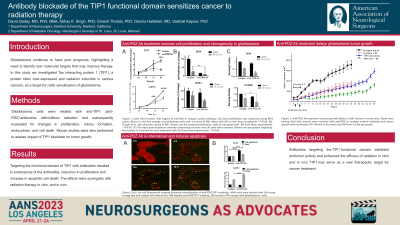Antibody blockade of the TIP1 functional domain sensitizes cancer to radiation therapy
Antibody Blockade of the TIP1 Functional Domain Sensitizes Cancer to Radiation Therapy
Friday, April 21, 2023


David YA Dadey, MD, PhD, MBA
Resident PGY6
Stanford University
Stanford, California, United States
ePoster Presenter(s)
Introduction: Glioblastoma continues to have poor prognosis, highlighting a need to identify new molecular targets that may improve therapy. In this study we investigated Tax interacting protein 1 (TIP1), a protein often over-expressed and radiation inducible in various cancers, as a target for radio sensitization of glioblastoma.
Methods: Glioblastoma cells were treated with anti-TIP1 antibodies with/without radiation and subsequently evaluated for changes in proliferation, colony formation, endocytosis, and cell death. Mouse studies were also performed to assess impact of TIP1 blockade on tumor growth.
Results: Targeting the functional domain of TIP1 with antibodies resulted in endocytosis of the antibodies, reduction in proliferation and increase in apoptotic cell death. The effects were synergistic with radiation therapy in vitro, and in vivo.
Conclusion : Antibodies targeting the TIP1 functional domain exhibited antitumor activity and enhanced the efficacy of radiation in vitro and in vivo. TIP1 may serve as a new therapeutic target for cancer treatment.
Methods: Glioblastoma cells were treated with anti-TIP1 antibodies with/without radiation and subsequently evaluated for changes in proliferation, colony formation, endocytosis, and cell death. Mouse studies were also performed to assess impact of TIP1 blockade on tumor growth.
Results: Targeting the functional domain of TIP1 with antibodies resulted in endocytosis of the antibodies, reduction in proliferation and increase in apoptotic cell death. The effects were synergistic with radiation therapy in vitro, and in vivo.
Conclusion : Antibodies targeting the TIP1 functional domain exhibited antitumor activity and enhanced the efficacy of radiation in vitro and in vivo. TIP1 may serve as a new therapeutic target for cancer treatment.
